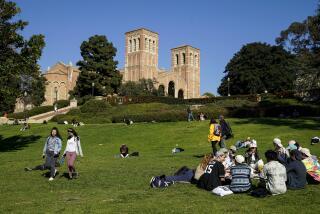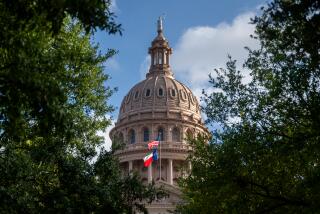GOP, Democrats Rest Their Cases in Washington Governor Dispute
Christine Gregoire was elected governor in November. Or Dino Rossi was. It depends on what the definition of “elected” is.
Nobody knows who really won -- so do it over.
Those were among the arguments thrown around in the last two weeks before state Judge John E. Bridges, who listened Friday to closing arguments in a challenge by state Republicans to the official certification of Democrat Gregoire’s 129-vote margin out of 2.9 million ballots cast.
Bridges, who said he would issue his verdict Monday, has presided over a trial that has had moments of hard-core legal combat by some of the state’s top litigators, but also moments of such sheer wackiness that both sides have been left laughing.
“Has election day ended in this case?” a lawyer for the Democrats’ Jenny Durkan asked Friday of the state deputy election director, John Pearson, whose retirement is being delayed by the trial.
“No, it has not,” said Pearson, sounding a bit weary.
“Is it fair to say the election community are humans?” Pearson asked, pressing the Democrats’ argument that no election of such scale could be perfectly counted.
“I believe they all are,” said Pearson, as the courtroom erupted in laughter. “Yes!”
Republicans said ballot-counting was so marred by errors -- including the counting of hundreds of ballots illegally cast by felons -- that the only proper legal remedy was to hold an unprecedented statewide revote.
Both sides produced polling experts who offered statistical models purporting to show who would have won if such improper ballots were not counted. Not too surprisingly, the experts consulted by Republicans said it would have been Rossi, and the Democrats’ witnesses said Gregoire would still have prevailed.
In another moment of levity, Judge Bridges, a bearded, bespectacled man who sports a diamond stud in his left ear, confessed to being left reeling by numbers offered by one statistics expert, University of Washington professor Anthony Gill.
Were he an undergraduate again, the judge said to more courtroom laughter, “I would run from your class like the wind.”
As it happened, the initial tally of ballots cast Nov. 2 showed Rossi ahead by a microscopic margin, as did a machine recount of those ballots, which put him up by 42 votes.
But Gregoire, following a procedure outlined in state election law for elections in which candidates are separated by 250 or fewer votes, asked for a hand recount of the ballots. Both candidates picked up hundreds of new votes that for various reasons were not scanned by the machines -- and this time Gregoire came out ahead.
Adding to the tumult was the discovery by a Democratic officeholder in heavily Democratic King County, which includes Seattle, that hundreds of properly cast ballots, including his own, had not been counted because of a signature-scanning problem in the election office’s computers.
Republicans smelled a huge rat, but Democrats countered that such problems occur in any big election -- and generally don’t matter because the race is not so mind-bogglingly close. (If it were a 100-meter dash, the candidates would be separated by a millimeter or so.)
Rossi, a former state senator from suburban Seattle vying to be the first Republican governor here in 20 years, pressed his demands for a revote as the only fair way to settle the matter, at one point saying he “wouldn’t want to take office with this cloud overhead.”
Gregoire rejected the revote idea, calling it “a mulligan,” and adding: “This is not golf.”
In any event, Gregoire was sworn into office in early January and announced she would govern the same way whether she had been elected by one vote or 1 million. She pushed a $26-billion biennial budget through the Legislature, which included a 9-cent-a-gallon tax increase to pay for key transportation projects.
Republicans, acting on behalf of Rossi, filed the lawsuit challenging the election in Chelan County, in central-Washington orchard country.
In arguments Friday, GOP lawyer Harry Korrell said that months of research had come up with evidence of at least 3,000 illegal votes, or “something like 20 times the margin separating the top two candidates.”
Calling that a “terrible situation,” Korrell told the judge he had both the “authority and duty to act and set aside the results of this election.”
But Durkan, arguing for the Democrats, said that the Republicans’ case was “more sound bite than legal theory” and that a revote would set a dangerous precedent encouraging legal contests in any close election.
And outside the tidy Chelan County Auditorium, where Bridges temporarily moved his courtroom because of wide interest in the case, state Democratic Chairman Paul Berendt said Republicans were “trying to tear down confidence” in the election system itself, with “unproven charges of sinister fraud.”
Both state parties have racked up massive lawyers’ bills for the trial, creating what state Republican Chairman Chris Vance calls “the legal equivalent of Gettysburg.”
Whichever party loses, the verdict is considered all but certain to be appealed to the state Supreme Court.
More to Read
Get the L.A. Times Politics newsletter
Deeply reported insights into legislation, politics and policy from Sacramento, Washington and beyond. In your inbox three times per week.
You may occasionally receive promotional content from the Los Angeles Times.






